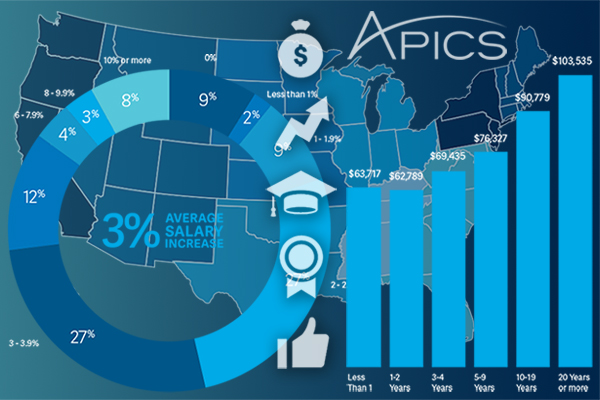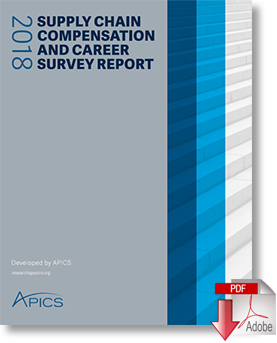Tenure, Leadership and Education Have the Most Impact on Supply Chain Salary Increases

A compensation and career survey by APICS, the association for supply chain management, reveals a healthy outlook for those employed in the supply chain, with wage increases and high job satisfaction reported across the profession.
Data from more than 2,600 U.S. supply chain professionals were gathered by APICS as it recently conducted the 2018 Supply Chain Compensation and Career Survey Report.
The report was published and contains many revealing details about the industry.
Indeed, the inaugural annual survey shows a healthy outlook for those employed in the supply chain, with wage increases and high job satisfaction reported across the profession.
Key findings reveal the average salary for supply chain professionals in 2017 was $85,210.
In addition, 90 percent of respondents received an average salary increase of at least 3 percent in 2017 and nearly all reported they are happy and likely to remain in the supply chain field.
Dean Martinez, executive vice president and chief operating officer at APICS, told Supply Chain Management Review in an interview that researchers were surprised that starting salaries for new hires were slightly higher than those of established managers.
“While the numbers were not that much more than the average salary, it indicates that younger people might be better at negotiating at the early stage of their careers. But it also speaks to the ‘war on talent’ that is being waged in other industries.”
According to Martinez, the finance and marketing sectors are wooing the same pool of young graduates vying for supply chain management positions.
“But the higher entry-level salaries are making our industry more competitive,” he says. “And that helps address some of the concerns young people might have with erasing student debt.”
APICS has a program in place to address the student debt issue, adds Martinez.
“And the intelligence we gathered on the advantages of APICS certification was also encouraging,” he says. “We were very excited by the number of members responding to our survey, and we plan to concentrate on compensation from now on.”
Martinez also notes that future surveys will be more international in scope.
“There’s a blurring of lines between logistics managers and supply chain managers when you examine the global arena,” he says. “Here in the U.S., logistics is seen as more tactical, and SCM more strategic. But the distinction is not always recognized in other countries. We aim to gain a better understanding of that in our next survey.”
The survey shows that continued professional education has a large impact on the salaries of supply chain professionals. Survey respondents who indicated holding one certification reported a median salary that was 19 percent more than their peers without certifications.
Respondents who earned an APICS certification reported a median salary that is 27 percent more than those who indicated that they did not have any certification. Certifications were also found to have a continuing career impact.
Among workers with the same tenure in the field, those with an APICS certification reported higher salaries than those without one. The survey revealed that, despite growth in compensation and job satisfaction, there still is work to do when it comes to addressing the pay gap between men and women within the field.
Survey Report Summarized Key Findings:
- Supply chain professionals experience high job satisfaction: When asked to rate their overall job satisfaction with working in the supply chain field overall, 96 percent of those surveyed reported high levels of satisfaction, with the average rating as 8.4 on a scale of 0-10. Overall, supply chain professionals are also satisfied with their current job position, reporting an average rating of 7.4.
- Tenure matters, but recent-graduates are seeing higher initial salaries: As might be expected, supply chain professionals with the highest level of tenure also receive the highest salaries. A $39,818 gap separates the average salaries of those with at least 20 years of work experience in the supply chain field and those with less than one year in the field. However, possibly due to the current demand for recent supply chain graduates, the average salary for recent graduates is slightly higher than the salary level for those with one to three years of tenure.
- Leadership roles increase salary prospects: The survey found roles that require supervision of others receive more significant compensation. Supply chain professionals who directly or indirectly supervise at least 50 individuals report an average base salary of about 82 percent more than those who do not supervise others; supervising even 1-4 individuals provides a 13 percent increase.
- The value of certification: Those who hold just one certification reported a median salary that was 19 percent higher than those who are not certified. Moreover, those with 2 or 3 certifications reported median salaries of 39 percent higher and 50 percent higher, respectively.
- The gender gap in the supply chain: The results of the survey show that there is a pay gap between men and women in the supply chain field, and wage disparity increases with field tenure. Male respondents reported average salaries that are 15.8 percent higher than those reported by female respondents.
Download: 2018 Supply Chain Compensation and Career Survey Report
Article Topics
ASCM News & Resources
Supply Chain Stability Index sees ‘Tremendous Improvement’ in 2023 Supply Chain Stability Index: “Tremendous Improvement” in 2023 The Right Approach for Supply Chain Education The reBound Podcast: Innovation in the 3PL supply chain Supply Chain’s Top Trends for 2024 Require Talent Investment for Success Resilience Certificate Now Available from ASCM ASCM conference highlights importance of geopolitics in the supply chain More ASCMLatest in Business
FedEx Announces Plans to Shut Down Four Facilities Women in Supply Chain: Ann Marie Jonkman of Blue Yonder U.S. Manufacturing is Growing but Employment Not Keeping Pace The Two Most Important Factors in Last-Mile Delivery Most Companies Unprepared For Supply Chain Emergency Microsoft Unveils New AI Innovations For Warehouses Let’s Spend Five Minutes Talking About ... Malaysia More BusinessAbout the Author















